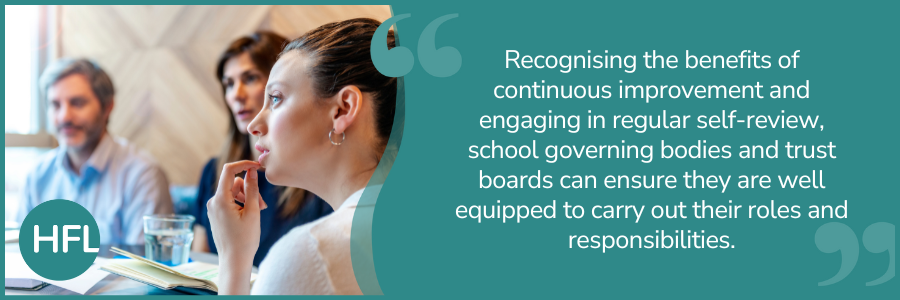
Self-evaluation is the starting point for a review of how your governing body drives school improvement and how effective it is. It is designed to be highly reflective on what you achieve as a team, but also as individuals and how you hold each other, and your school, to account. How do you know you are an effective governing body?
Both the new governance guides for the Maintained (section 1.2) and Academy/ MAT (section 4.8) sectors have a clear and similar message on board self-evaluation. For instance, the Academy Trust Governance guide states:
Evaluation considers:
- board effectiveness and the quality of decision-making
- the board’s impact on efficiency and board/staff workload
- skills needed for governance
- readiness for growth if that is appropriate
- individual performance of trustees, for example, their contribution to board discussions
Board effectiveness can decline over time for a variety of reasons. It could be that you have a very stable, long-standing board where it’s possible that ‘group think’ begins to hold sway. This is where a board often makes decisions without challenge or critique in order not to upset individuals or the harmony of the board. Equally a board with a relative high turnover of governors/ trustees, leading to a lack of experience or knowledge of the challenges at hand, may make for erratic or unthought out decisions and where strategic aims get lost through constantly firefighting problems.
What is key is ‘who’s around the table’? Do you have the right mix of experience, skills and knowledge? Has the relevant training been undertaken, and on a regular basis? Does your board reflect the community it serves? Are all voices round the table heard and viewpoints respected? Do all governors contribute at meetings and undertake visits and have link roles? Does the board have a clear vision for the next 3 years, what are the challenges and solutions and are KPI’s in place to measure progress?
Self-review, when conducted effectively, can have a positive impact on the governance and overall performance of a school. Some of the key benefits include:
- boards becoming more strategic, accountable, and transparent in their work, leading to better decision-making and resource allocation
- working smarter, reduces workload, improves governor and board effectiveness
- by identifying strengths and areas for improvement, boards can develop training pathways for their members, resulting in more effective governance
- shared link roles and other key roles i.e co-chair model can help manage the workload
- effective self-reviews foster a collaborative relationship between the board and school leadership, ensuring common understanding on strategic goals and priorities
- an effective self-review process can build trust among stakeholders, including parents, staff, and the wider community
- better and more appropriate challenge at GB meetings
- clearer vision for next 3 years, what are the challenges and solutions
- strong governance will hopefully translate into improved educational outcomes for students
- plans for orderly succession are in place bringing certainty and stability to the board’s leadership
It’s also key to say that self-evaluation isn’t a one off ‘looking under the bonnet’ but needs to be carried out regularly, some boards will do this annually, then every 3-4 years support this with an external review of governance to sense check their self-evaluation. The Academy sector must have a programme of internal scrutiny and it’s essential that governance is reviewed as part of a rolling programme of internal audit, self-evaluation plays its part in evidencing that effective governance is being monitored.
Recognising the benefits of continuous improvement and engaging in regular self-review, school governing bodies and trust boards can ensure they are well equipped to carry out their roles and responsibilities. Done well, it can ensure that the board is clearly positioned to meet the needs of its pupils, staff and wider community and create an environment where all can thrive and reach their potential.
If you would like to learn more about how we can help support your board with self-evaluation please contact our helpdesk: governance@hfleducation.org



